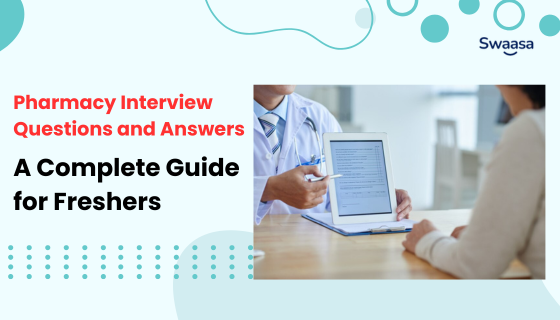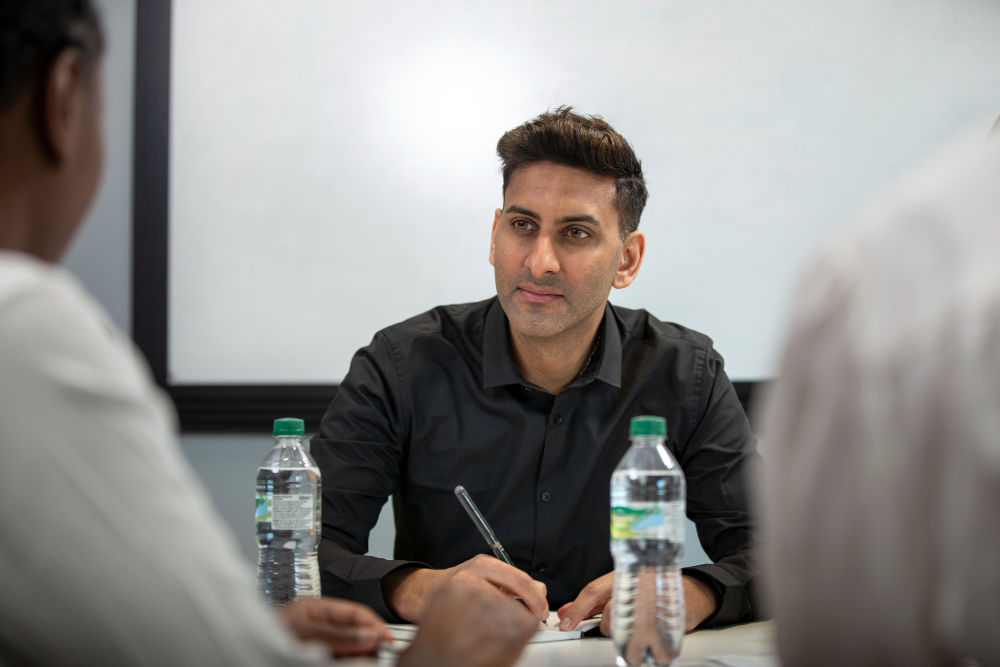
Pharmacy Interview Questions and Answers: A Complete Guide for Freshers

08-Nov-2024
Pharmacy Interview Questions and Answers: A Complete Guide for Freshers
Introduction
The pharmacy profession is both rewarding and challenging, requiring a mix of technical knowledge and interpersonal skills. Whether you’re preparing for your first job interview or looking to transition into a new role, understanding common pharmacy interview questions can greatly enhance your confidence and performance. This guide covers various pharmacy interview questions, particularly focusing on freshers, alongside practical answers to help you succeed in your interview journey.
Why This Guide is Important
- High Demand: The pharmacy industry in India is rapidly growing, and with that comes an increasing number of job opportunities.
- Preparation is Key: Being prepared can set you apart from other candidates and help you articulate your strengths effectively.
- Evolving Field: Staying updated with common interview questions is crucial in a dynamic field like pharmacy.
Here’s a comprehensive list of 40 common pharmacy interview questions along with suggested answers. These questions cover a wide range of topics, including general pharmacy knowledge, technical skills, situational scenarios, and company-specific queries, making them suitable for freshers and experienced candidates alike.

Common Pharmacy Interview Questions and Answers
General Pharmacy Questions
1. Why did you choose to pursue a career in pharmacy?
Answer: I chose pharmacy because of my passion for healthcare and my desire to help patients manage their medications effectively. The role of a pharmacist combines science and patient care, which excites me.
2. What are the primary responsibilities of a pharmacist?
Answer: The primary responsibilities include dispensing medications, counseling patients about their medications, conducting health screenings, and collaborating with healthcare professionals to ensure optimal patient care.
3. What do you consider the most important skill for a pharmacist?
Answer: Strong communication skills are crucial for a pharmacist. They help in effectively counseling patients and collaborating with healthcare teams.
4. How do you stay current with pharmaceutical developments and regulations?
Answer: I stay updated by attending seminars, reading professional journals, and participating in online courses related to pharmacy and healthcare regulations.
5. What role does a pharmacist play in patient safety?
Answer: A pharmacist ensures patient safety by reviewing prescriptions for accuracy, providing medication counseling, and monitoring for potential drug interactions.
Technical Knowledge Questions
6. Can you explain the different forms of dosage?
Answer: Dosage forms include solid forms like tablets and capsules, liquid forms such as solutions and suspensions, and topical forms like creams and ointments, each suited for different patient needs.
7. What is pharmacokinetics?
Answer: Pharmacokinetics studies how the body absorbs, distributes, metabolizes, and excretes drugs, which is crucial for determining proper dosing and frequency.
8. What are the potential side effects of common medications?
Answer: Common side effects can include nausea, dizziness, headaches, and allergic reactions, varying by medication class. For instance, opioids can cause constipation and sedation.
9. How would you counsel a patient on a new medication?
Answer: I would explain the medication's purpose, how to take it, potential side effects, and the importance of adhering to the prescribed regimen, encouraging any questions.
10. What is the difference between brand-name and generic drugs?
Answer: Brand-name drugs are marketed under a proprietary name by a specific company, while generic drugs contain the same active ingredients and are marketed after the patent expires, usually at a lower cost.
Situational Questions
11. How would you handle a situation where a patient is non-compliant with their medication?
Answer: I would first understand the reasons for non-compliance by asking open-ended questions, provide education on the importance of adherence, and discuss alternatives that may work better for them.
12. Describe a time when you had to deal with a difficult customer.
Answer: I once encountered a customer upset about a delayed prescription. I listened to their concerns, apologized for the inconvenience, and provided updates until the prescription was ready, which helped diffuse the situation.
13. What would you do if you found an error in a prescription?
Answer: I would immediately halt the dispensing process, verify the prescription with the prescribing physician, and correct the error before proceeding, ensuring patient safety is prioritized.
14. How would you respond to a colleague who is not following proper protocols?
Answer: I would address the issue directly with the colleague, emphasizing the importance of following protocols for patient safety, and offer to assist them in understanding the procedures better.
15. If a patient has questions about a medication you are not familiar with, how would you handle it?
Answer: I would reassure the patient that I would find the information they need. I would research the medication using reliable sources and follow up with the patient as soon as possible.
Questions for Freshers
16. What are your strengths and weaknesses as a pharmacist?
Answer: My strengths include strong analytical skills and a commitment to patient care. A weakness is my inexperience with certain complex medications, but I actively seek opportunities to learn.
17. What projects or internships have you completed during your B Pharmacy studies?
Answer: I completed an internship at XYZ Pharmacy, where I gained hands-on experience in dispensing medications, managing inventory, and providing patient counseling.
18. How has your education prepared you for a career in pharmacy?
Answer: My education has provided me with a solid foundation in pharmacology, patient care, and ethics in pharmacy practice, which are essential for my role as a pharmacist.
19. What challenges do you expect to face as a new pharmacist?
Answer: I expect challenges such as managing diverse patient needs and keeping up with ongoing pharmaceutical advancements, but I am eager to learn and grow.
20. How would you contribute to a pharmacy team?
Answer: I would contribute by being a proactive team member, offering support to colleagues, sharing knowledge, and ensuring a collaborative approach to patient care.
Apollo Pharmacy Specific Questions
21. What do you know about Apollo Pharmacy’s services?
Answer: Apollo Pharmacy offers a range of services, including prescription medications, health check-ups, and wellness products, focusing on patient-centered care and convenience.
22. Why do you want to work at Apollo Pharmacy?
Answer: I admire Apollo Pharmacy’s commitment to quality healthcare and its innovative approach to pharmacy services. I believe I can contribute positively to the team.
23. How would you align with Apollo Pharmacy’s mission?
Answer: I align with the mission by prioritizing patient care, continuously seeking to improve my knowledge and skills, and contributing to community health initiatives.
24. Describe how you would handle a busy pharmacy environment.
Answer: I would prioritize tasks, remain organized, and communicate effectively with team members to ensure efficient workflow while maintaining quality service for patients.
25. What initiatives would you suggest to improve patient engagement at Apollo Pharmacy?
Answer: I would suggest implementing patient education workshops on medication management and disease prevention, along with utilizing social media for health awareness campaigns.
Pharmacy Calculation Questions
26. How would you calculate the dosage of a medication for a pediatric patient?
Answer: I would use the child's weight in kilograms and apply the appropriate formula, ensuring to adjust the dosage based on the medication guidelines.
27. If a prescription calls for 500 mg of a medication, and you have 250 mg tablets, how many tablets would you dispense?
Answer: I would dispense two tablets since 500 mg divided by 250 mg equals two.
28. How would you calculate the total volume of a solution if the desired concentration is 10% and you have 200 grams of solute?
Answer: The total volume can be calculated using the formula: Volume = Mass / Concentration. So, 200g / 0.10 = 2000 mL.
29. What is the formula to calculate the infusion rate for a patient receiving intravenous therapy?
Answer: The formula is: Infusion Rate (mL/hr) = Total Volume (mL) / Time (hr).
30. If a medication needs to be diluted in a 1:4 ratio, how much diluent would you add to 10 mL of medication?
Answer: For a 1:4 ratio, you would add 40 mL of diluent to 10 mL of medication (10 mL x 4 = 40 mL).
Behavioral and HR Questions
31. How do you handle stress in a pharmacy setting?
Answer: I manage stress by staying organized, prioritizing tasks, and taking short breaks to refocus. I also practice mindfulness techniques to maintain composure.
32. What is your approach to continuous professional development?
Answer: I actively pursue professional development through attending workshops, enrolling in online courses, and participating in professional organizations to stay updated with industry trends.
33. Describe a situation where you had to work as part of a team.
Answer: During my internship, I collaborated with a team to improve patient counseling services, which involved brainstorming ideas and implementing new practices to enhance patient communication.
34. What would you do if you disagreed with a physician about a prescription?
Answer: I would respectfully discuss my concerns with the physician, presenting evidence-based information to support my viewpoint, prioritizing patient safety in the conversation.
35. How do you prioritize tasks during busy periods?
Answer: I prioritize tasks based on urgency and impact, ensuring that patient needs are met first while managing my time efficiently.
Company-Specific Questions for Other Pharmacies
36. What do you know about MedPlus Pharmacy?
Answer: MedPlus Pharmacy is known for its commitment to customer service, offering a wide range of healthcare products and services, including online prescriptions and health consultations.
37. How would you represent Life Pharmacy's values in your work?
Answer: I would embody Life Pharmacy's values by providing compassionate patient care, actively engaging in community health programs, and upholding ethical practices in all my interactions.
38. What interests you about working for CVS Pharmacy?
Answer: CVS Pharmacy's focus on innovation in healthcare delivery and its commitment to community health initiatives resonate with my career goals and values.
39. How can you contribute to the culture at Rite Aid?
Answer: I can contribute by fostering teamwork, promoting a patient-centered approach, and engaging in community outreach programs that align with Rite Aid's mission.
40. What are your long-term career goals in pharmacy?
Answer: My long-term goal is to advance in pharmacy practice, possibly in a clinical role or management position, where I can lead initiatives that improve patient care and medication management.
Conclusion
This collection of questions and answers should help you prepare thoroughly for any pharmacy interview. Tailor your responses to reflect your personal experiences and insights for a more authentic approach. Good luck with your interview!

AUTHOR

Related Jobs


